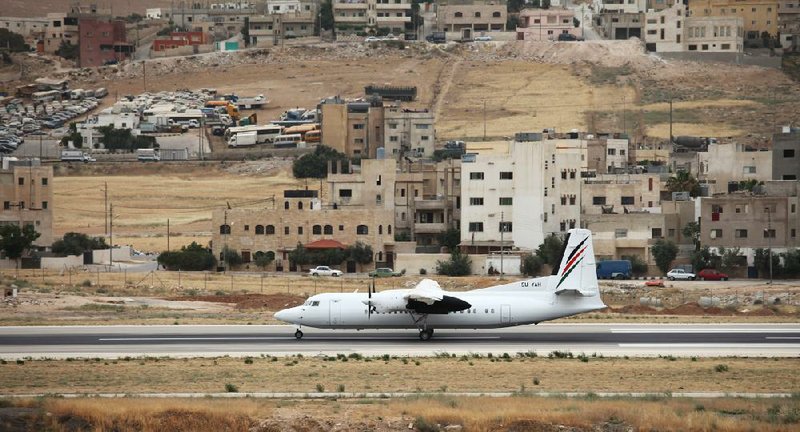MARKA AIRBASE, Jordan — Palestinian Airlines is back in the skies after being grounded for seven years by the deepening enmities of the Israeli-Palestinian conflict.
Once hailed as a symbol of Palestinian statehood dreams, the carrier is a tiny operation, with just two 48-seat turboprop planes, two weekly flights and a borrowed hub in Egypt.
But Palestinians say just being on the map again is what matters.
“My hands were shaking when I bought the ticket ... and it said the name of the carrier is Palestinian Airlines,” said recent passenger Zuhair Mohammed, a 38-year-old teacher from Gaza.
The 15-year-old airline’s fortunes have been closely tied to the quest for a Palestinian state.
In the late 1990s, when Palestinians appeared on the verge of a statehood deal with Israel, Palestinian Airlines operated from Gaza International Airport, flew tens of thousands of passengers a year to Middle Eastern destinations and planned to expand to Europe.
Those ambitions were crushed by the outbreak of a Palestinian uprising against Israeli occupation in September 2000, after the collapse of U.S.-led peace talks. During the next year, Israeli troops destroyed the Gaza airport, and Palestinian Airlines was forced to move its base to El-Arish, an Egyptian coastal resort about 37 miles from Gaza.
Seven years ago, the airline stopped flying altogether after its reservoir of passengers dried up. It had mainly served Gazans who, starting in 2005, could no longer reach El-Arish because of increasingly frequent Israeli closures of Gaza’s borders.
The closures accompanied an Israeli troop withdrawal from Gaza in 2005 and intensified with the capture of an Israeli soldier by Gaza militants a year later and the violent takeover of Gaza by the Islamic militant Hamas in 2007.
Until last year, the vast majority of Gaza’s 1.7 million residents were locked inside the territory, in part because Egypt went along with Israel and largely kept its Rafah border terminal with Gaza closed.
After the ouster of Egyptian President Hosni Mubarak in 2011, Rafah gradually reopened and Gazans are now able to travel, though restrictions remain, particularly for men under 40, who need Egyptian security clearance.
Palestinian Airlines once again had potential customers. On May 9, it resumed operations, starting with biweekly flights between El-Arish and Marka Airbase in the Jordanian capital of Amman. The new route means Gazans no longer have to travel to Cairo,215 miles from their territory, to board planes.
Mustafa Abu Dan, a Palestinian civil servant, on Sunday bought four tickets at a Gaza City travel agency for a flight to Amman. He said he’s pleased to be saving time and money, but he worried Gazans and their travel plans will always be vulnerable to political upheaval.
“Rafah is the only gate for us to the world now, but still it’s linked to the political developments in Egypt,” said Abu Dan, 32. “I voice my hope to have our own airport again so we can travel without problems, like others.”
In one of the many political twists of Palestine air travel, the carrier is owned by the Palestinian Authority, the West Bank-based political rival of Gaza’s Hamas rulers.
Gaza and the West Bank lie on opposite sides of Israel, which has banned virtually all movement between the two territories. Palestinians hope that one day they will be united into a state, with east Jerusalem as its capital. All three were captured by Israel in the 1967 Mideast War.
The West Bank does not have an airport, and Israel is unlikely to approve Palestinian Authority plans to build one, citing security concerns. West Bank residents have to fly from neighboring Jordan.
Palestinian Airlines operates two Fokker 50 turboprop planes, remnants of the original fleet that also included a since-retired Boeing 727. The Fokkers were donated by the Netherlands and the 727 by Saudi Arabia.
On Sunday, the Amman-El-Arish flight carried 27 passengers, and 44 were booked on the return trip later in the day. The flight takes one hour and 35 minutes, more than double the time needed for the direct route over Israel. The airline does not have permission to cross Israeli air space, said regional director Azmi Samaan.
Airline officials said flights to Saudi Arabia for Muslim pilgrims from Gaza are set to begin later this week, and routes to the United Arab Emirates and Turkey are being planned.
Front Section, Pages 6 on 05/28/2012
